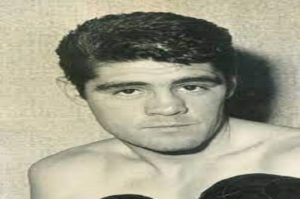Ringside Report Looks Back at Boxer Jimmy Anderson (1942-2022)
 By Donald “Braveheart” Stewart
By Donald “Braveheart” Stewart
He was born on the very first day of a highly prodigious month. It was the month in which Oxfam was founded, Australia became autonomous from Britain, milk rations in the United Kingdom were cut to two and a half pints per week, the second battle of El Alamein in Egypt was commenced, Nazi Germany was at its height of power in Europe, the Enigma Machine was taken from a German submarine in the Mediterranean by British sailors and in London, international figures gathered to register their outrage at the Holocaust.
October 1942.
Meanwhile on the 1st of that very month, in Waltham Cross, Hertfordshire, a boy who became a man who fought at featherweight, super featherweight and lightweight made his first entrance – Jimmy Anderson, 27-9-1, 24 KOs.
Anderson was Britain’s very first junior lightweight (it became super featherweight in 1986) champion in February 1968: you shall search in vain for the current champion as junior lightweight was abolished in 1970, ironically making him the last junior lightweight champion, until its return as a weight but not with that title in the mid-1980s.
1964-10-05
129¼ Dave Savva
129 0 1 0 Lyceum Ballroom, The Strand W TKO 2/6 event bout wiki scores
His first professional fight, in 1964, at the Lyceum Ballroom, in The Strand, London, saw him stop Dave Savva in the second round. By 1966, he was fighting for a regional belt – the Southern Area title – against Johnny Mantle – at lightweight on the 31st of October at the Manor Place Baths in Walworth. This was shown on live TV as both fighters had impressed last time out – on the Floyd Paterson/ Henry Cooper fight in Wembley. This was an absolute cracker of a fight. A hard hitter who never knew when to stop, Anderson was after that belt, after Mantle and after this fight the British title was surely his next assured step?
Around five months later he was at the highly prestigious venue of the Royal Albert Hall where he took on and beat the Japanese champion, Hiroshi Shoji, on points, on the 7th of March 1967.
His chance to fight for a British title came with the recognition by the British Boxing Board of Control of the junior lightweight category. Unbeaten Jimmy Revie was to provide him with the challenge and on the 20th of February at the Royal Albert Hall, Anderson stopped Revie in the ninth – thus becoming the very first title holder at that weight category in Britain. Revie, it was reported at the time, had boxed well, and managed to get into the lead but he could not keep Anderson at bay. Anderson was to catch him and in the ninth and stop him completely. Anderson also served as manager Terry Lawless’s very first British champion!
Whilst the Mantle fight caught the attention of the British public, the one most quoted regarding his career came in April 1968 when he was in against Howard Winstone, at the Empire Pool in London. Winstone was the WBC featherweight champion and whilst this was a non-championship bout it was a chance to show his craft and his skill. Anderson lost on points over 10 rounds, but when Anderson floored Winstone in the first round, it looked as if he might manage to record a key win.
Anderson returned to the drawing and defended his British crown first against Brian Cartwright, who he had beaten 2 years previously on points, in the Royal Albert Hall, and then against Colin Lake at the Royal Albert Hall on the 25th of February 1969. Lake was stopped in the seventh, after a previous, non-title fight between them had seen Anderson disqualified in the sixth for kidney-punching. The first fight had been made at two pounds over the weight limit to protect Anderson’s British title. Having won the second fight against Lake and his third British title fight, Anderson was now the outright owner of a Lonsdale belt.
Anderson then went on to challenge WBC featherweight champion Johnny Famechon, in another no championship contest. It was another agonizing loss, by the slightest of margins, though Anderson broke Famechon’s jaw!
On, the 16th of February 1971 he fought Brian Hudson, who was the Southern Area lightweight champ. It was to be his final fight, and fittingly at the Royal Albert Hall. With one second left in the sixth, Hudson connected beautifully, with a left hook, which floored Anderson and gave the referee a decision to make. He decided to call the fight off and Hudson the winner.
In his 37 fights, he had fought 35 of them in London, the other two included one in Leeds and the other in Manchester.
Looking back at his record it is hard not to wonder at what this hard puncher could have been responsible for in the modern game. Of the 9 losses, 4 were by disqualification and in the Boxing News obituary by Simon Euan Smith, he quotes one writer saying that Anderson threw punches “like a deranged octopus.” His manager claimed that Anderson was not a dirty fighter, just a careless one. But this careless fighter had a style which was truly fan friendly and fearless. His memory lingers as he lost his life late last year, just a few months shy of his 80th birthday. The world may have changed somewhat since his birth but the intervening period for fight fans were improved by his time spent in the ring, fighting the good fight.

